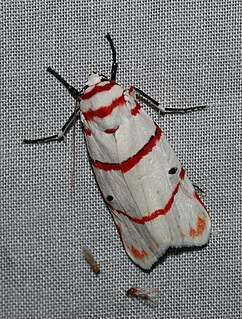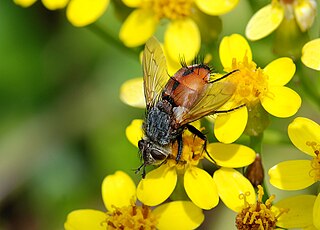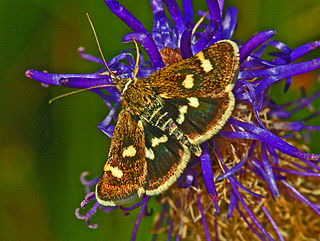Related Research Articles

The variable dancer is a damselfly of the family Coenagrionidae. It is native to North America, where it is widespread throughout the east and present in the interior western United States.

Hypena is a genus of moths in the family Erebidae. It was first described by Franz von Paula Schrank in 1802. These non-migratory moths overwinter as pupae and almost never come to bait as adults.
Bucaea is a genus of tiger moths in the family Erebidae. The moths in the genus are found in Hindustan.
Ceramidia is a genus of moths in the subfamily Arctiinae. The genus was erected by Arthur Gardiner Butler in 1876.

Cosmosoma is a genus of tiger moths in the subfamily Arctiinae. The genus was erected by Jacob Hübner in 1823.

Cyana is a genus of moths in the family Erebidae. Species are well distributed in Africa, Madagascar, China, India, Sri Lanka, Myanmar, Sumatra, Java and Borneo. The genus was erected by Francis Walker in 1854.

Tachina is a genus of large flies in the family Tachinidae. There are approximately 600 species worldwide. Most have larvae that are parasitoids of Lepidopteran caterpillars.

Phragmatobia is a genus of moths in the subfamily Arctiinae described by Stephens in 1828. Many tiger-moth species of small and medium size were described within this genus. However, only a few are related to the type species.

Glyphodes is a genus of moths of the family Crambidae described by Achille Guenée in 1854.

Udea is a genus of snout moths in the subfamily Spilomelinae of the family Crambidae. The genus was erected by Achille Guenée in 1845. The currently known 214 species are present on all continents except Antarctica. About 41 species are native to Hawaii.
Soloe is a genus of moths in the family Erebidae. The genus was erected by Francis Walker in 1854.

Psaltoda is a genus of cicada found in eastern Australia. Originally described by Carl Stål, the type species is Psaltoda moerens known as the redeye, and P. plaga is a well-known species from eastern Australia, known as the black prince. Fifteen species are recognised. Relationships of the species with each other remains unclear.

Odontiinae is a subfamily of moths of the family Crambidae. The subfamily was described by Achille Guenée in 1854.
Bucaea fumipennis is a moth of the family Erebidae. It was described by George Hampson in 1891. It is found in the Nilgiri Mountains of India.
Ceramidia phemonoides is a moth of the subfamily Arctiinae. It was described by Möschler in 1854. It is found in Ecuador and the Amazon region.
The Euchromiina are a subtribe of tiger moths in the family Erebidae. It was described by Arthur Gardiner Butler in 1876. Many species in the subtribe are mimics of wasps.

Okanagana is a genus of cicadas in the family Cicadidae. There are at least 60 described species in Okanagana.

Cleora alienaria is a moth of the family Geometridae first described by Francis Walker in 1860. It is found in Sri Lanka, the Indian subregion to the Andaman Islands, Thailand, Sundaland, Taiwan, and Lesser Sundas as far east as Timor and Christmas Island.
Eupeodes fumipennis is a species of syrphid fly in the family Syrphidae.

Margaroniini is a tribe of the species-rich subfamily Spilomelinae in the pyraloid moth family Crambidae. The tribe was erected by Charles Swinhoe and Everard Charles Cotes in 1889.
References
- ↑ Savela, Markku. "Ceramidia fumipennis (Walker, 1854)". Lepidoptera and Some Other Life Forms. Retrieved February 4, 2018.
| This Euchromiina-related article is a stub. You can help Wikipedia by expanding it. |